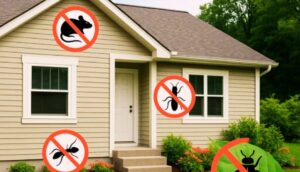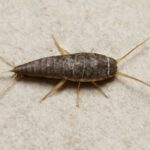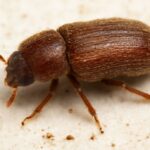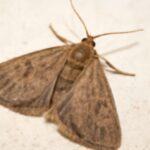Treating and Controlling Root Aphids

Root aphids are common garden pests found in potted plants, greenhouses, and gardens, Their feeding will reduce plants’ vigor, causing garden plants to become susceptible to mildew, root rot, and other diseases. Early detection and treatment are important for a plant’s health and vigor.
There are numerous ways to control root aphids if you are having issues with these pests; it is not the end for your prized garden plants. Here is what to do to manage their population where root aphids are no longer a threat.
Signs of Root Aphids
Signs that indicate the presence of root aphids.
- The leaves are smaller than normal.
- The leaves of plants are discolored.
- Leaves are damaged, turning yellowish to brown.
- Plant leaves begin to wilt.
- White residue is seen that has the appearance of fungal growth.
- Stunted plant growth.
- The plant’s roots are damaged.
Root Aphid Identification
To properly identify root aphids, here’s what to look for.
Root aphids are not easily seen because they live in the soil or below ground where they feed or suck the sap from a plant’s root system which means symptoms above ground level call for some digging below the soil line to get to the root of the problem. These garden pests are small, possess soft pear-shaped bodies, and vary in colors from greenish to white, whitish, yellow, or brown. They have antennas and 6 legs, and depending on their stage, can either have wings or be wingless.
Root Aphid Life Cycle
The nymphs or the young of root aphids take about 9 to 10 days on average to reach maturity; their life expectancy is estimated to be 30 days, depending on the species.
How to Control Root Aphids Without Pesticides
The first control to root aphids is to use the non-pesticide approach that can protect against soil contamination and possibly wind drift that can reach beneficial insects and pollinators, which can lead to their injury or death.
- Make sure you’re growing healthy plants because healthy plants are more able to withstand and regain their vigor when facing garden pests or disease issues.
- Check the roots of seedlings or plugs before repotting or planting to ensure there are no root aphids.
- If root aphids are discovered, make sure to thoroughly wash the roots to get rid of this pest and repot plants in fresh, healthy soil.
- Plant root parts that are root aphid-infested and damaged should be pruned or removed from the plant.
- Take cuttings of healthy plants that are infected.
Beneficial nematodes
The introduction of beneficial nematodes into infected soil will help to control root aphids and other soil-borne pests.
Dispose of Infested Soil
Avoid dropping infected soil or stepping in it, which can cause insects to be transferred to healthy garden areas.
How to Control Root Aphids with Pesticides
When growing plants in pots or containers or the ground, your first line of defense is to grow healthy plants, meaning proper cultural practices that involve growing potted plants in the right soil type, the right amount of sunlight, and water, also include a fertilizer program to provide the required nutrients.
If insecticides must be used, make sure and incorporate the right pesticide. When treating root aphids, make sure and follow the manfacture’s directions on the label for proper use that will give the best results. Treating potted plants with broad-spectrum systemic insecticides can be watered into the soil. The plant’s root system will take up or absorb the systemic insecticide, as root aphids feed on the treated plant root, they will ingest the insecticide, leading to their death.
10 Frequently Asked Questions (FAQs)
1. What exactly are root aphids, and why are they a problem?
Root aphids are tiny, sap-sucking insects that live in the soil and feed on the roots of plants. Unlike regular aphids that stay on leaves, these guys work underground—often undetected until your plants start to suffer. They can cause yellowing, stunted growth, and even plant death if left untreated.
2. How can I tell if I have root aphids or something else?
Great question! Root aphid damage can look similar to nutrient deficiencies—like yellow leaves or wilting—but the real clue is in the roots. Gently pull out a plant and check for small, waxy white or brownish insects clinging to the roots. If you see tiny, pear-shaped bugs with a waxy coating, you likely have root aphids.
3. Can I get rid of root aphids naturally without using harsh chemicals?
Absolutely! Neem oil drenches, beneficial nematodes, and diatomaceous earth are all great natural options. You can also use a hydrogen peroxide soil soak (diluted properly) to clean the root zone. These methods take a bit of patience, but they’re safer for your plants and the environment.
4. What are beneficial nematodes, and how do they help with root aphids?
Beneficial nematodes are microscopic roundworms that attack and kill soil-dwelling pests like root aphids. You simply mix them with water and pour them into the soil. They seek out the aphids, enter their bodies, and kill them from the inside out. Nature doing pest control—how cool is that?
5. How safe is it to use hydrogen peroxide on the roots?
Yes, but use it carefully! A diluted mix (typically 1 part 3% hydrogen peroxide to 4 parts water) can help disinfect the root zone and kill aphids on contact. Just avoid overdoing it—too much can harm beneficial microbes in the soil.
6. Do root aphids spread to other plants easily?
Unfortunately, yes. Root aphids can crawl through the soil or hitch a ride on tools, containers, or runoff water. They reproduce quickly, so it’s important to treat all affected areas and isolate any infested plants if possible.
7. Can the soil be reuse after a root aphid infestation?
It’s not recommended. Root aphids leave eggs and waxy residue in the soil, making it hard to fully sanitize. If you’re growing indoors or in containers, it’s best to toss the old soil, wash the pots thoroughly, and start fresh to avoid reinfestation.
8. Are yellow sticky traps useful for root aphids?
They can be! While sticky traps won’t kill root aphids underground, they help catch the winged adult aphids that fly to new plants to start fresh colonies. Using them gives you a heads-up if the infestation is spreading.
9. What’s the best long-term prevention for root aphids?
Prevention starts with healthy soil. Use clean containers, sterile potting mix, and avoid overwatering. Introducing beneficial soil microbes or companion planting with marigolds or garlic can also help. And always inspect new plants before bringing them home!
10. Can chemical insecticides get rid of root aphids fast?
Yes, systemic insecticides can wipe them out quickly—but they come with risks, especially for edible plants. Products containing imidacloprid or pyrethrins are commonly used, but be sure to read labels carefully and consider safer options first if you can.
Conclusion
Controlling root aphids can become a challenge, especially if there is an infestation. Early detection is key to treating these garden pests. If your garden plants are showing the above-ground symptoms, don’t delay but take quick action to stop root aphids in their tracks, and don’t allow them to take over your garden. The implementation of these proven methods will help manage, control, and eliminate the root aphid population.









